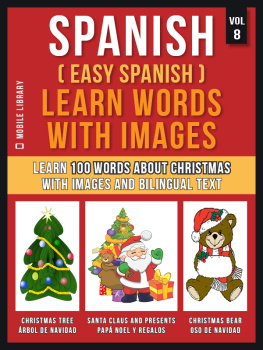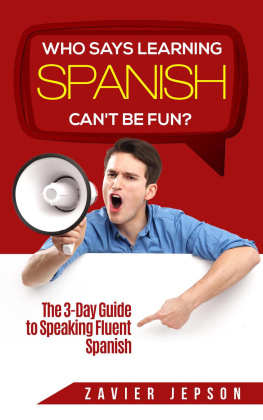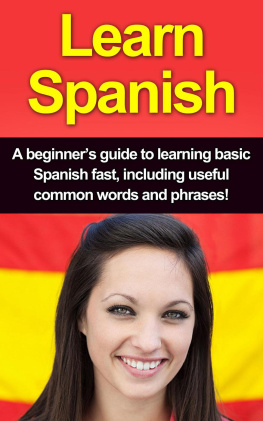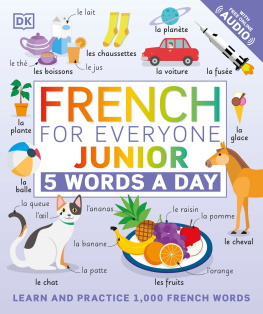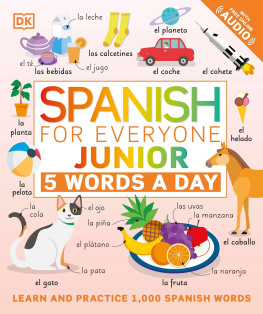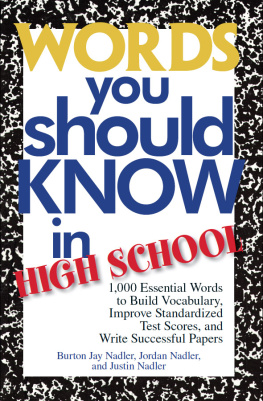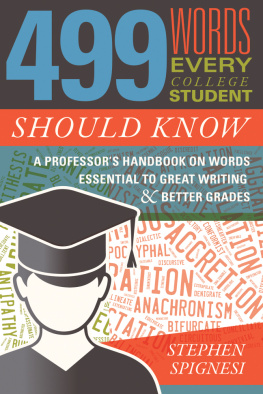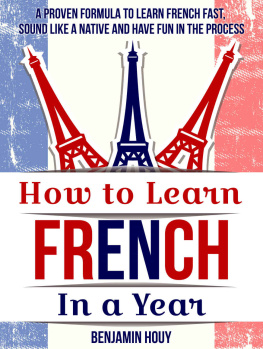a day
=
fluent in a year
SHELDON ANDERSON

AuthorHouse
1663 Liberty Drive
Bloomington, IN 47403
www.authorhouse.com
Phone: 1-800-839-8640
2012 by Sheldon Anderson. All rights reserved.
No part of this book may be reproduced, stored in a retrieval system, or transmitted by any means without the written permission of the author.
First published by AuthorHouse 02/01/2012
ISBN: 978-1-4685-5072-6 (sc)
ISBN: 978-1-4685-5071-9 (ebk)
Library of Congress Control Number: 2012902094
Printed in the United States of America
Any people depicted in stock imagery provided by Thinkstock are models, and such images are being used for illustrative purposes only.
Certain stock imagery Thinkstock.
This book is printed on acid-free paper.
Because of the dynamic nature of the Internet, any web addresses or links contained in this book may have changed since publication and may no longer be valid. The views expressed in this work are solely those of the author and do not necessarily reflect the views of the publisher, and the publisher hereby disclaims any responsibility for them.
CONTENTS
Every language spoken on this planet is all about pronunciation, vocabulary, and grammar. Thats it. When you have all three down, you have the language down. My old college Chinese professor once said that learning a language is like building a house. You need some bricks and you need the blueprints. The vocabulary is the bricks and the grammar is the blueprints. If you only had the opportunity to use one (the bricks or the blueprints) which would you choose? Thats right the bricks. Sure, the house wont be perfect, but youll be able to get by. Whats the use of knowing all the grammar (the rules of a language) in the world when you do not even know a single vocabulary word ? Whats the use of staring at a blueprint all day long when you dont even have the materials to build the house?
Anyone would be happy if they knew enough to get by in a foreign country. The main thing we use language for is to get our wants and needs across to the next person. What if youre stuck in Mexico and there is no one around that speaks English? What if you were out walking along the highway all day in the sun and you found a gas station that had drinks. Do you need to say Could you please help me by giving me a glass of cold water to drink, for I am very thirsty? Yes, that would be nice to say if you had the time to perfect your foreign language ability. But all you really need in that moment is to say, Thirsty water, please.
And there you have it. You would know just enough vocabulary to get by; and in some cases, just enough vocabulary to survive. So what is my point here? Vocabulary, vocabulary, vocabulary. That is the priority above all else. Weve all been frustrated when listening to somebody speak in our target language (the language that you are trying to learn) and couldnt understand a thing they were saying. This is so because they have used words in a sentence that you havent learned yet! I remember when I was a beginner student in the Chinese Language in college. A Chinese person would speak to me and I would be thinking, man, I hope he doesnt use words I havent learned yet.
Another way that people get discouraged about learning a foreign language is because they were taught it in schools and it seemed so hard. Guess what, its not that hard; its usually the fault of the teachers. They are told to follow protocol and teach a certain way. Here is a good example: In a funny movie called Election, there were students in the classroom who were learning Spanish. The teacher had them going through endless drills about conjugating verbs . But when the teacher said in Spanish to one of the students that he was needed in the principals office, all he said was Huh? He had no idea what she was saying. It wasnt his fault. If the teacher had them spend more time on vocabulary than the grammar, he would have been much better off. Remember, vocabulary is the name of the game. The pronunciation and the grammar will come in time. Stick to learning those 5 words a day and youll find yourself ahead of the game in no time.
A B C D E F G H I J K L M N O P Q R S T U V W X Y Z
Spanish Alphabet (30 letters) How to pronounce is in parenthesis.
a(ah)/ b (bay)/ c (say)/ ch (chay)/ d (day)/ e (ay) f (ay-fay)/ g (hay)/ h (ah-chay)/ i (ee)/ j (hoh-ta)/ k (kah)/ l (ay-lay)/ ll (ay-yay)/ m (ay-may)/ n (ay-nay)/ (ay-nyay)/ o (oh)/ p (pay)/ q (coo)/ r (ay-ray)/ rr (ay-rray)/ s (ay-say)/ t (tay)/ u (oo)/ v (oo-vay)/ w (doh-blay oo)/ x (ay-kees)/ y (Eegree-ay-gah)/ z (say-tah)
Vowels
English:A E I O U
Spanish: | A | E | I | O | U |
(ah) | (ay) | (ee) | (oh) | (oo) |
Pronunciation tips
If the word ends with an n s or a vowel, place the emphasis on the 2nd to last syllable. Example: mo chi la (backpack or rucksak)
If the word ends with anything else other than n s or a vowel, place the emphasis on the last syllable. Example: glorifi car (to glorify)
If a word has an accent mark above the letter, simply put the emphasis where the accent mark is. Example: a tn (tuna) or ca pi tulo (chapter)
I | > | yo | a, an | > | un (masculine)/plural unos (some) una (feminine)/plural unas (some) |
me | > | me |
he | > | l | the | > | el (masculine) la (feminine) |
she | > | ella | the (plural) | > | los (masculine) las (feminine) |
it | > | lo, la | yours | suyo, suya /plural suyos suyas |
they | > | ellos, ellas | or | > | o |
their | > | su/sus (plural) | and | > | y |
we | > | nosotros | here | > | aqu |
our, ours | > | nuestro,a | there | > | all |
who | > | quin | for | > | para/por |
which | > | cul | you | > | (subject/familiar) t (object or subject/polite) usted/ustedes (plural) (object/familiar) ti |
what | > | qu | is | > | es |
this | > | Esto, este, esta | are | > | est |
these | > | estos, estas | my | > | mi (singular), mis (plural) |
that | > | eso/ese/esa | you (all) | > | vosotros, vosotras |
some | > | algunos, (masculine) algunas (feminine) | I am | > | (permanent) soy/(temporary)estoy |
Next page


